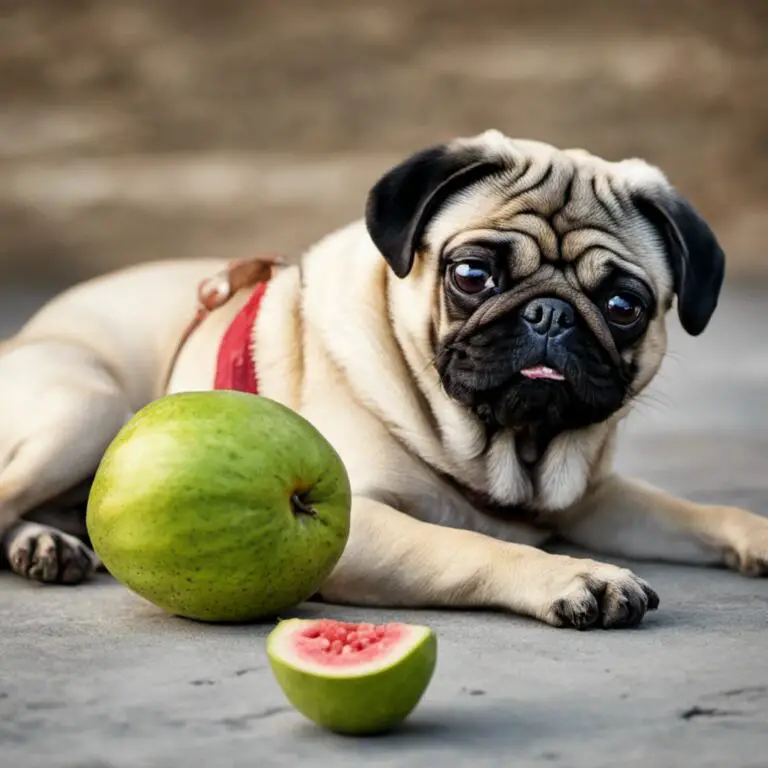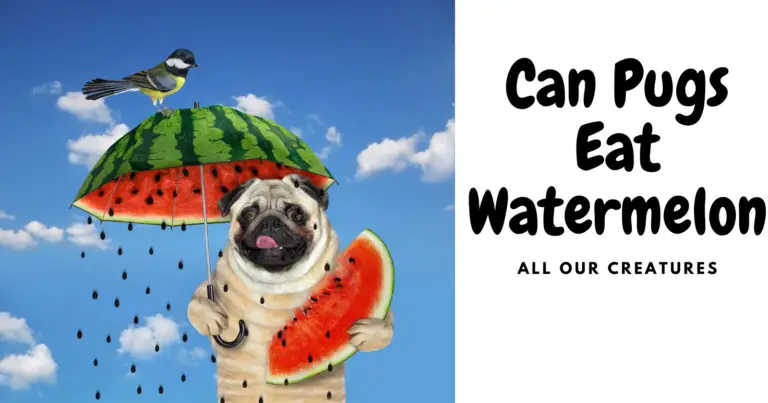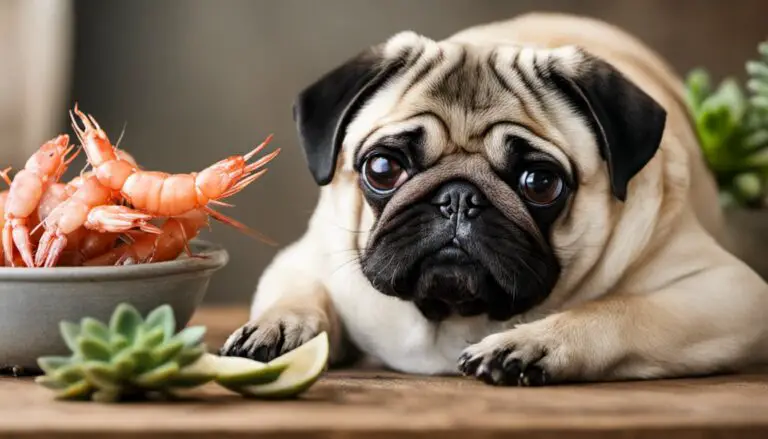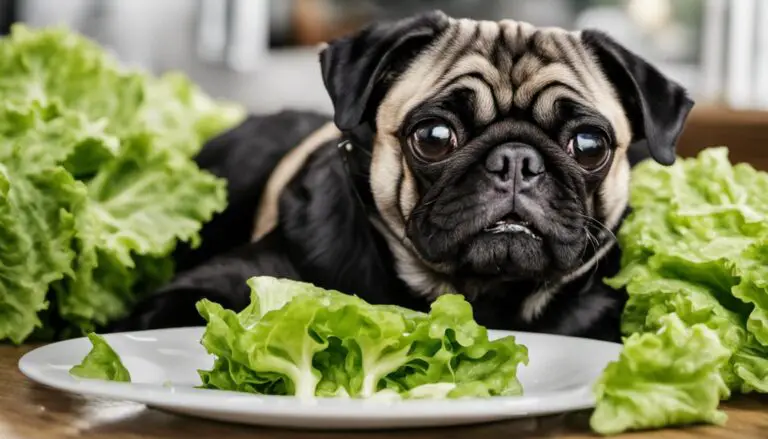Can Pugs Eat Papaya: A Comprehensive Guide to Their Diet
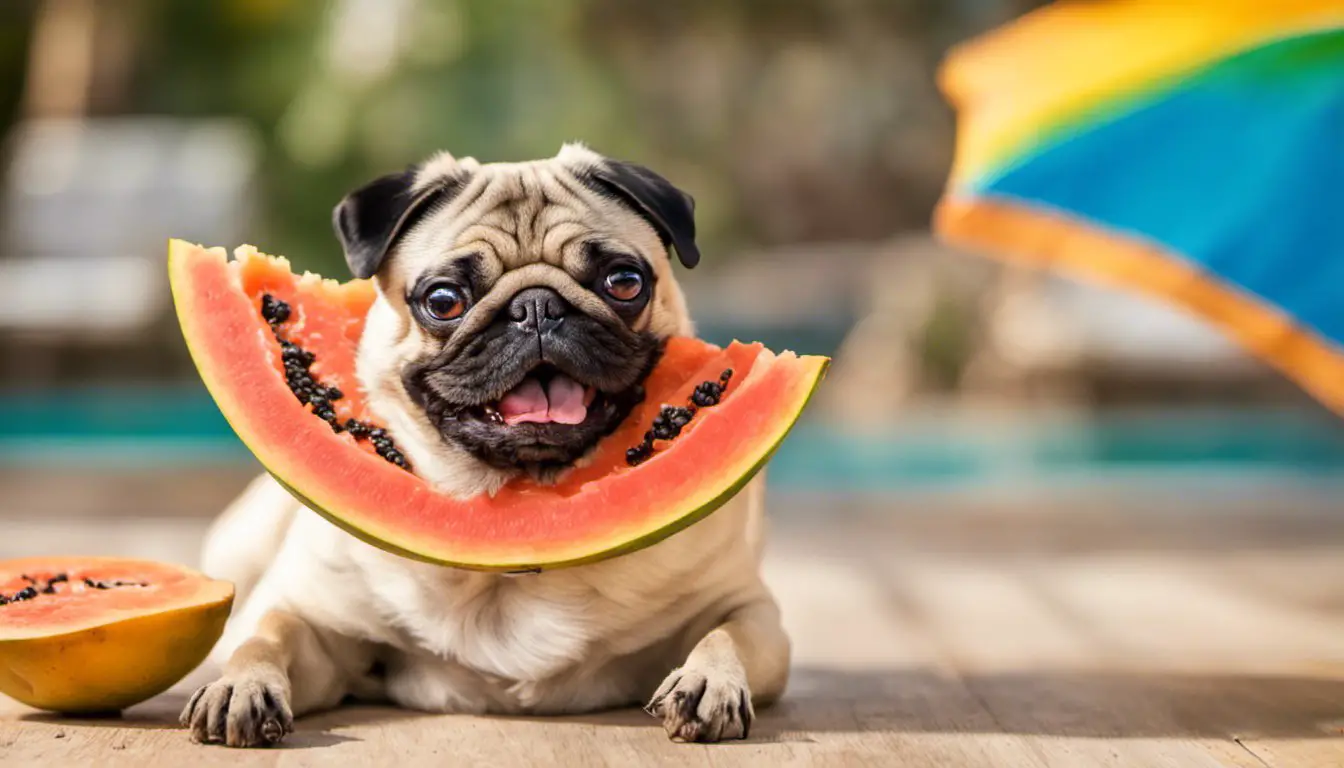
As a pug owner, you might have asked yourself, “Can pugs eat papaya?” Understanding your beloved pet’s dietary needs and restrictions is essential for maintaining good health and well-being. This article will discuss the safety and benefits of feeding papaya to your pug.
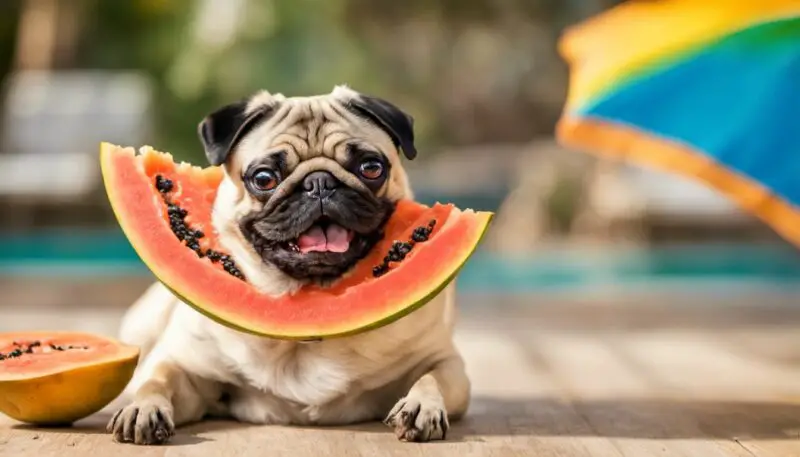
Papaya, a tropical fruit, is both delicious and nutritious. It’s packed with vitamins and minerals that can provide numerous health benefits for humans and dogs like pugs. Including this fruit in your pug’s diet can help support their immune system and aid in digestion. However, it’s important to be cautious about the quantity and preparation, as too much or an improper presentation can lead to some issues.
The following sections will explore the benefits and potential risks of feeding papaya to your pug and guidelines for proper serving sizes and preparation methods. Armed with this information, you can decide to incorporate this tasty treat into your dog’s meal plan.
Contents
Table of Contents
Can Pugs Eat Papaya?

Yes, pugs can eat papaya safely and in moderation. In fact, this fruit can provide several nutritional benefits to your pug. Papaya is rich in vitamins A and C, potassium, and fiber, which can help support your pug’s immune system and overall health1.
Get The Free Food Eating Guide That Keeps My Pug Happy and Playful Even at 13 Years Old
100% Beginner Friendly & Lists Real Foods Your Pug Can Actually Eat!

When feeding papaya to your pug, make sure you remove the seeds, as they can pose a choking hazard. Also, peel the skin off before offering it to your pet, as it can be difficult to digest. It’s advisable to start with a small amount to see how your pug reacts to this new treat.
Papaya can be a healthy occasional treat for your pug, but it should not replace their regular diet1. It is always best to maintain a balanced diet for your pug, which consists mainly of high-quality dog food that meets their specific nutritional needs.
In addition to papaya, other fruits such as blueberries, bananas, and apples can also be suitable treats for pugs. However, always avoid fruits that are toxic to dogs, like grapes and raisins.
Remember that moderation is key when it comes to feeding your pug any treats, including papaya1. While it is a nutritious fruit, overfeeding can lead to an upset stomach or diarrhea. Observing how your pug reacts and adjusting the serving size accordingly is essential.
The Diet of Pugs
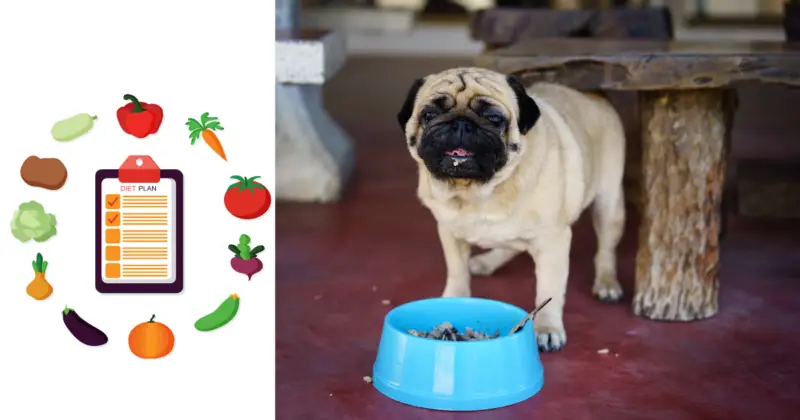
Regarding your pug’s diet, ensuring they receive a well-balanced and nutritious meal plan is essential for their overall health and well-being. Different types of foods affect pugs in different ways, so it’s important to know what’s best for your furry friend.
A proper diet for pugs should include quality proteins from both meat and plant sources. Meat provides essential amino acids and nutrients, which can be supplemented with additional vegetables and fruits. One of the best options for pug-specific dog food is Royal Canin Breed Health Nutrition Pug Dry Dog Food, designed for your pet’s nutritional needs. This dog food contains the correct amount of calories, fats, and proteins to ensure your pug stays healthy and fit.
Fruits and vegetables can serve as ideal, low-calorie snacks for your pug. For example, apples, which are a great source of vitamins A and C and fiber, can make for a tasty, nutritious treat. Remember to remove any seeds and cores but leave the skin on, as your pug can digest it without any issues. Another example is carrots, which are high in beta-carotene and fiber, but be sure to provide them in moderation.
Sometimes, it may be beneficial to feed your pug homemade or raw food treats, including a blend of raw meats and shredded bones. Such meals offer essential nutrients and minerals, and your pug might enjoy the variety of their typical kibble diet. As always, consult your vet before changing their meal plan.
Ultimately, it’s crucial to monitor your pug’s diet and adjust as needed to maintain their health. Monitoring their weight, energy levels, and overall demeanor will give you insight into their nutritional needs. When in doubt, consult your vet to ensure you provide the best possible diet for your beloved pug.
Fruits in Pug’s Diet
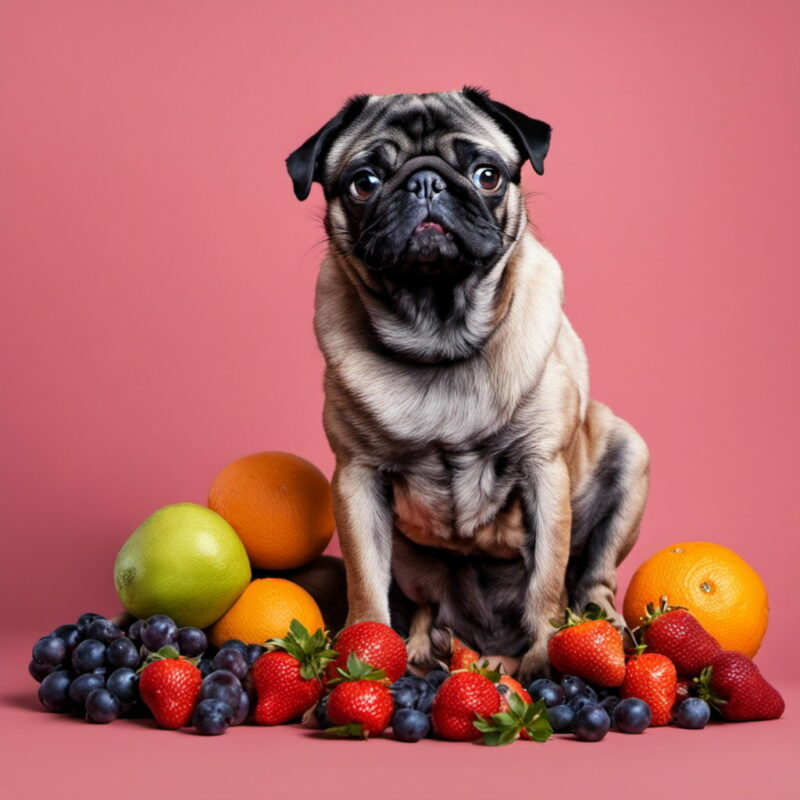
Safe Fruits for Pugs
Incorporating fruits into your Pug’s diet can provide them with essential vitamins and nutrients. Many fruits are safe for Pugs to consume, but moderation is key to preventing potential health issues.
Berries, such as blueberries, strawberries, and raspberries, are packed with antioxidants and can be a healthy snack for your Pug. However, only feed 2 blackberries per 10 pounds of body weight daily, as larger amounts can lead to digestive issues.
Apples and bananas are also great options, but avoid feeding the seeds and core to your Pug as they may cause blockages or choking. Carrots and sweet potatoes, though not fruits, can serve as excellent vegetable treats for your Pug, providing essential nutrients and promoting dental health.
Other fruits like cantaloupe, mango, and watermelon can safely be fed to your Pug in small quantities since they are rich in vitamins and water content, assisting in hydration and their overall well-being. Be sure to always remove any seeds or rinds before giving these fruits to your Pug.
Toxic Fruits for Pugs
While various fruits and vegetables can be safe for your Pug, knowing which ones can be harmful is crucial. Some fruits contain toxic compounds or pose choking hazards, such as:
- Grapes and raisins: These can cause kidney failure in dogs, so they should always be avoided.
- Peaches and plums: The pits of these fruits contain cyanide, which is toxic to dogs.
- Oranges: Although not entirely toxic, the high acid content and natural sugars in oranges can lead to upset stomachs and diarrhea. It’s best to limit their consumption or avoid them altogether.
Remember that when introducing any new fruit or treat to your Pug’s diet, start with small amounts, and monitor their response. Opt for organic products when possible, as they have fewer pesticides and chemicals. Remember to maintain a balanced diet for your Pug, offering fruits as occasional treats rather than the main staple of their meals.
Human Foods That Are Unsafe for Pugs
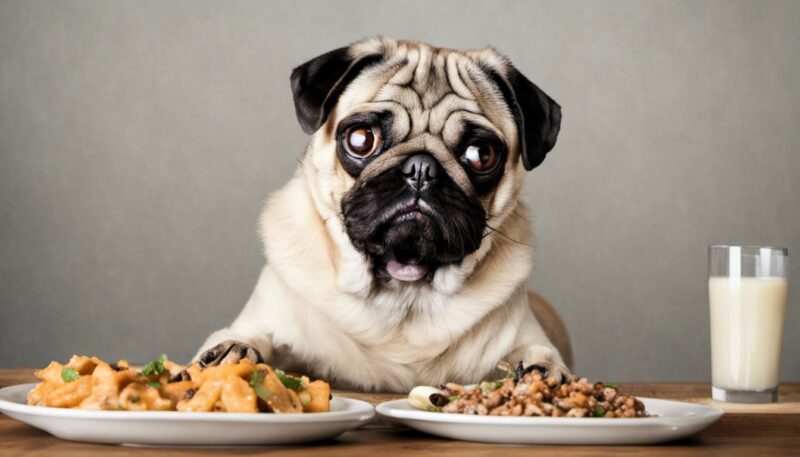
As a responsible pug owner, it’s crucial for you to know which human foods can be harmful to your beloved pet. Many common foods can be toxic or even poisonous to pugs, causing severe health issues if consumed. This section will discuss some of the most hazardous human foods for pugs.
First, let’s talk about fruits that can harm your pug. Avocado contains a substance called persin, which can lead to vomiting and diarrhea in dogs. Additionally, fruits such as cherries, plums, and green tomatoes contain pits that can cause choking hazards or digestive blockages. Be especially cautious with grapes and raisins, as they can cause kidney failure in dogs.
Next on the list are vegetables that can be dangerous for your pug. Although tomatoes themselves are not toxic, green tomatoes and their leaves can be harmful due to their solanine content. Similarly, mushrooms can be toxic to dogs, depending on the species. It’s best to avoid giving your pug mushrooms to prevent any potential poisoning.
Now, let’s discuss some other toxic foods for pugs. Chocolate is well-known for being dangerous to dogs, as it contains theobromine, which can cause vomiting, diarrhea, and even death. Garlic and onions are also unsafe for pugs, as they can lead to anemia and other serious health issues. Be sure to avoid giving your pug anything containing caffeine, such as coffee or tea, as it can cause hyperactivity, seizures, and even death.
Finally, it’s crucial to be aware of dangerous ingredients found in some human food products. Macadamia nuts can cause weakness, vomiting, and hyperthermia in dogs. Xylitol, a sugar substitute often found in sugar-free gum and other products, can rapidly release insulin, causing hypoglycemia, seizures, and even death in pugs.
To summarize, remember to avoid giving your pug the following unsafe human foods:
- Avocado
- Cherries, plums, grapes, and green tomatoes
- Mushrooms
- Chocolate
- Garlic and onions
- Caffeine-containing products
- Macadamia nuts
- Products containing xylitol
By being mindful of these dangerous foods, you can protect your pug’s health and prevent potential emergencies.
Can Pugs Eat Papaya? Watch this
The Impact of Diet on Pug’s Health
As a pug owner, it is important to ensure your furry friend maintains a healthy diet. A well-balanced diet contributes significantly to your pug’s overall health, helping them avoid issues such as obesity, skin problems, and high cholesterol.
One essential aspect to consider in your pug’s diet is calorie intake. By providing the right number of calories, you can support your pug in staying at a healthy weight. Overfeeding your pug may lead to overweight or obese conditions, increasing the risk of various health concerns such as kidney failure and high cholesterol levels.
Paying attention to the fat content in your pug’s food is also vital. While some fat is necessary for maintaining overall well-being, excessive fat can result in obesity, skin issues, and other complications. Always promote a well-balanced diet with moderate fat content for optimal health.
Additionally, be cautious of feeding your pug foods that are not good for their digestion. Consumption of certain foods might cause vomiting or diarrhea. To avoid these issues, always ensure a diet rich in healthy nutrients while avoiding foods that might cause gastric distress.
When considering a new food, such as papaya, for your pug, it is crucial to understand the potential ramifications on their health. High in vitamins A and C, papaya is safe for pugs to consume in moderation. However, overconsumption may lead to gastrointestinal discomfort, so proceed cautiously.
In conclusion, taking charge of your pug’s diet ensures its overall health, longevity, and happiness. Promoting a well-balanced, nutrient-rich diet contributes to a healthy weight, beautiful coat, and long life for your beloved pug.
Recommended Dog Food for Pugs
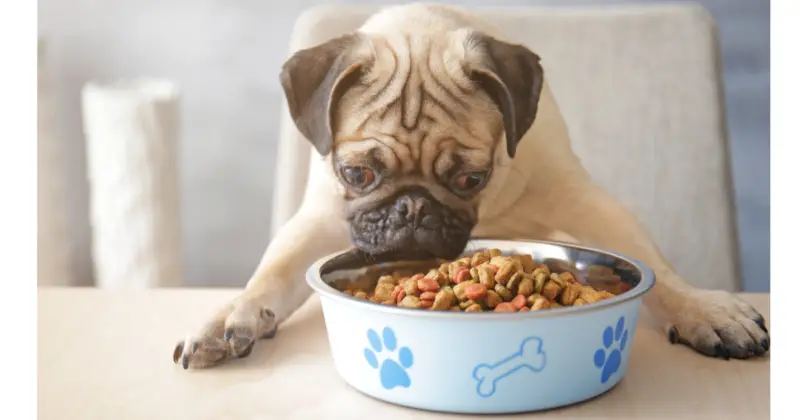
As a pug owner, you might be wondering about the best dog food options for your pet. Choosing the right dog food ensures your pug receives proper nutrition and maintains a healthy lifestyle. This section will discuss a variety of dog food options that are specifically tailored to meet the dietary needs of pugs.
When selecting a dog food for your pug, consider options that are rich in protein. High-quality proteins, such as chicken, beef, and fish, are essential for maintaining your pug’s lean muscles and overall health. A Royal Canin Breed Health Nutrition Pug Dry Dog Food is one example of a suitable dry dog food specifically created for the nutritional requirements of pugs aged 10 months and up.
In addition to dry dog food, you can also consider wet dog food options for your pug. Wet food may be a suitable alternative for pugs with difficulty chewing or prefer softer textures. When choosing a wet dog food, ensure it is made from high-quality ingredients and contains a balanced nutritional profile.
Introducing fresh fruits and vegetables to your pug’s diet can be a healthy addition to their existing dog food choices. However, remember to serve these in moderation to prevent gastrointestinal issues or weight gain. Speak with your vet about which fruits and vegetables best suit your pug. For instance, some professionals recommend carrots as they are abundant in fiber and beta-carotene.
Before introducing new foods into your pug’s diet, consult with your veterinarian to ensure the ingredients are safe and beneficial for your pet. Remember, each pug may have specific dietary requirements, and your vet is the best source of guidance when it comes to tailoring a meal plan for your furry friend. Regular check-ups with your vet can also help ensure your pug maintains optimal health throughout their life.
Important Nutrients for Pugs

As a pug owner, you should know the essential nutrients contributing to your furry friend’s overall health. One key element to remember is vitamins, which are crucial in maintaining a robust immune system and supporting various biological processes. Vitamins like vitamin A and vitamin C can be especially beneficial, as they help with vision, skin health, and immune response.
Potassium is another beneficial nutrient for your pug. This essential mineral helps maintain proper muscle function, heart health, and hydration levels. In addition to potassium, ensure that your pug’s diet contains adequate amounts of fiber, which helps regulate digestion and bowel movements. Fiber can be found in various fruits and vegetables, which can be a healthy addition to your pug’s meals.
Toxin exposure is something you should always be cautious about, as some natural foods can contain harmful substances that affect pugs negatively. Always research the safety of specific foods for your pug and consult with a veterinarian when in doubt.
Antioxidants are valuable nutrients that help combat free radicals and reduce inflammation. Foods rich in antioxidants can be introduced into your pug’s diet to ensure they receive these compounds’ protective benefits. Minerals, including calcium and phosphorus, contribute to a pug’s bone health and are vital for proper growth and development.
It’s essential to provide your pug with different vitamins and minerals in their diet for overall wellness and to tackle potential deficiencies. For example, you can incorporate kale into your pug’s meals, as it’s an excellent source of vitamins A and C, potassium, fiber, and antioxidants.
Remember, as a responsible pug owner, staying informed about the essential nutrients for your canine companion allows you to make better dietary decisions and promote their optimal health. Always consult a veterinarian when making significant changes to your pug’s diet to ensure they meet all their nutritional requirements.
Potential Hazards of Foods for Pugs

When feeding your pug, it’s essential to be aware of the potential hazards that some foods can pose. Certain foods may be toxic or unsafe for your pug, leading to various symptoms and health issues.
Choking hazard is a significant concern for pug owners, as these dogs have a brachycephalic skull, which means they have a short, compressed facial structure. This can make it challenging for them to chew and swallow certain foods properly. When feeding your pug, avoid large chunks or hard foods that could be difficult for them to swallow and may cause choking.
Corn is a common ingredient found in many dog food products, but it can pose potential hazards for pugs. Some dogs, including pugs, may be allergic to corn and develop various symptoms such as itching, skin rashes, or gastrointestinal issues like diarrhea. Additionally, corn cobs can become lodged in a dog’s throat or digestive tract, leading to choking or blockages.
Regarding toxic foods, it’s crucial to keep an eye on ingredients that can harm pugs, such as chocolate, which contains theobromine, a toxic substance for dogs, causing symptoms like vomiting, increased heart rate, and seizures. Additionally, cooked bones should be avoided, as they can splinter and cause injury to your pug’s digestive system.
Remember to monitor your pug for any unusual symptoms or behavior after eating new foods, paying close attention to signs like lethargy, vomiting, or difficulty breathing. If you notice any of these symptoms, contact your vet immediately for further guidance.
Keep your pug’s diet balanced, safe, and free from potential hazards. You can ensure a happy and healthy relationship with your beloved companion by staying informed and vigilant.
Special Considerations for Pug Owners

As a pug owner, it’s important to know your pug’s dietary needs and restrictions. Pugs have unique nutritional requirements, and understanding what they can and cannot eat is crucial to ensure their health and well-being.
One item you might be curious about is papaya. While some fruits and vegetables are suitable for your pug, there are important factors to consider before introducing it into their diet. Regarding papaya, the good news is that it’s generally safe for your pug to consume in moderation. Fresh, ripe papaya can provide valuable nutrients like vitamin C and dietary fiber to support your pug’s overall health. However, removing the seeds and peeling is essential to avoid any potential health issues.
Remember that dry dog food specifically formulated for small dog breeds is often the best option when planning your pug’s diet. This type of food encourages chewing, aids digestion, and prevents tartar buildup. The Royal Canin Breed Health Nutrition Pug Dry Dog Food is an excellent choice as it caters to the nutritional needs of purebred pugs aged 10 months and up.
While some fruits and vegetables can be a healthy addition to your pug’s diet, it’s essential to be aware of foods that are toxic or harmful to your pet. For example, avocados should be avoided as they contain persin, a toxin that can lead to vomiting and diarrhea in pugs.
In conclusion, as a responsible pug owner, it’s crucial to be well-informed about your dog’s dietary requirements. You can ensure a happy, healthy, and thriving companion by providing them with well-balanced meals and occasional healthy treats like papaya.
Frequently Asked Questions: Can Pugs Eat Papaya
Can pugs eat cooked potatoes?
Yes, pugs can eat cooked potatoes in moderation. Cooked potatoes are a good source of vitamins and minerals for your pug. However, be careful not to add any seasonings like salt or spices, as these can be harmful to your dog. Additionally, it’s important to avoid giving your pug raw or green potatoes, as they contain a harmful substance called solanine.
Is it safe for dogs to eat potatoes and carrots?
It is generally safe for dogs, including pugs, to eat both potatoes and carrots. Carrots are a healthy, low-calorie treat that is rich in fiber and beta-carotene. However, be sure to feed your pug carrots and potatoes in moderation to avoid any digestive issues or weight gain.
What are the risks of dogs eating potato skins?
Potato skins can pose a risk to dogs if they contain any solanine, a toxic substance found in green or unripe potatoes and their skins. Additionally, potato skins can sometimes be difficult for dogs to digest, which may lead to gastrointestinal issues. If you choose to feed your pug cooked potatoes, it’s best to remove the skin first.
Are sweet potatoes safe for pugs to consume?
Sweet potatoes are safe and nutritious for pugs to consume. They are rich in fiber, vitamins, and minerals, which can be beneficial for your pug’s overall health. Just like with regular potatoes, be sure to cook the sweet potatoes and avoid adding any seasonings or spices. Feed sweet potatoes in moderation to maintain a balanced diet for your pug.
Can pugs have potatoes and eggs?
Yes, pugs can have both potatoes and eggs as part of a balanced diet. Eggs are a great source of protein and can be beneficial for your pug’s overall health. Make sure to cook both the potatoes and eggs thoroughly before feeding them to your pug, and avoid adding any seasonings or spices that could be potentially harmful.
Is raw potato harmful to dogs?
Raw potatoes can be harmful to dogs, including pugs, due to the presence of solanine, a toxic substance found in green or unripe potatoes. Additionally, raw potatoes are difficult for dogs to digest, which can lead to gastrointestinal issues. To ensure the safety and health of your pug, always cook potatoes thoroughly before feeding them to your dog.

